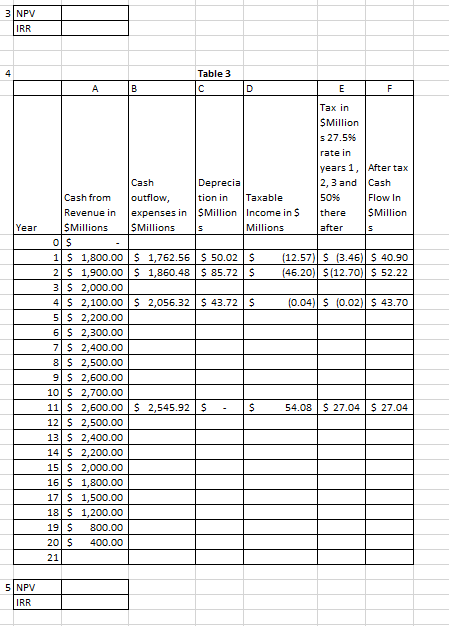Question
Calculate the NPV and IRR using the data from Table 2. Should the project be accepted? The following questions will be used to assist in
Calculate the NPV and IRR using the data from Table 2. Should the project be accepted?
The following questions
 will be used to assist in evaluating the proposed project's risk.
will be used to assist in evaluating the proposed project's risk.
The CFO is particularly concerned about the potential impact of future tax increases and that the expenses may have been systematically understated. In order to undertake an objective evaluation of the project's risk, she asks you to prepare a second analysis with a less favorable set of assumptions. She asks, "What would happen to the NPV and IRR calculations if the cash outflow for expenses comes in 2% higher than estimated for the entire life of the project and if the tax rate increases to 50% (combined Federal and Maryland state rates) starting in year 4?" Create an after-tax cash flow timeline for the proposed factory with these new assumptions in Table 3 below.
Calculate the NPV and IRR using the data from Table 3. 6. Considering all of your work in questions 1 through 5, should the project be accepted? Discuss the risk and the potential reward of this project for McCormick.
Details of McCormick Plant Proposal As you know from Project 4, McCormick & Company is considering building a new factory in Largo, Maryland. McCormick & Company decided to offer $4,424,000 to obtain the land for this project. The new factory will require an initial investment of $350 million to build the new plant and purchase equipment. Questions: 1. What will be the depreciation for tax purposes each year? Complete Table 1 below to answer this question. Note: the total deprecation for tax purposes will be $350 million. You have been asked to continue your work from project 4 with a full analysis of the proposed factory, including the start-up costs, the projected net cash flows from operations, the tax impact of depreciation, and the cash flow impacts of changes in working capital. 2. Create an after-tax cash flow timeline for the proposed factory in Table 2 below. Note: The CFO estimates that operations for the company will be profitable on an on-going basis. As a result, any accounting loss on this specific project will provide a tax benefit for the company overall in the year of the loss. 3. Calculate the NPV and IRR using the data from Table 2. Should the project be accepted? The investment will be depreciated as a modified accelerated cost recovery system (MACRS) seven-year class asset. The correct depreciation table is included below. The following questions will be used to assist in evaluating the proposed project's risk. The company will need to finance some of the cash to fund $17 million in accounts receivable and $14 million in Inventory starting at year zero. The company expects vendors to give free credit on purchases of $15 million (accounts payable). The CFO wants you to consider the net cash outflows for working capital as well as the cash outflows for the plant, equipment, and land in year zero. Note: The $17 million for accounts receivable and the $14 million for Inventory are cash outflows. The $15 million for accounts payable is a cash inflow. 4. The CFO is particularly concerned about the potential impact of future tax increases and that the expenses may have been systematically understated. In order to undertake an objective evaluation of the project's risk, she asks you to prepare a second analysis with a less favorable set of assumptions. She asks, "What would happen to the NPV and IRR calculations if the cash outflow for expenses comes in 296 higher than estimated for the entire life of the project and if the tax rate increases to 50% (combined Federal and Maryland state rates) starting in year 4?" Create an after-tax cash flow timeline for the proposed factory with these new assumptions in Table 3 below. The CFO has indicated that this net working capital will be recovered as a cash inflow in year 21. She also estimates that the company will be able to sell the factory, equipment, and land in year 21 for $40 million. 5. Calculate the NPV and IRR using the data from Table 3. 6. Considering all of your work in questions 1 through 5, should the project be accepted? Discuss the risk and the The company estimates that the cash flows from operations will be as shown in Table 2. Note: Only the cash flows related to operations (years 1-20) will generate accounting profits and thus taxable income (or losses). 3 NPV IRR 4 Table 3 B D E F Tax in SMillion s 27.596 rate in years 1, After tax Cash Deprecia 2,3 and Cash Cash from outflow, tion in Taxable 5096 Flow In Revenue in expenses in SMillion Income in $ there $Million Year $Millions SMillions s Millions after s 0 $ 1 $ 1,800.00 $ 1,762.56 $ 50.02 S (12.57) $ (3.46) $ 40.90 21 $ 1,900.00 $ 1,860.48 $ 85.72 $ (46.20) $(12.70) $ 52.22 3 $ 2,000.00 4 $ 2,100.00 $ 2,056.32 $ 43.72 $ (0.04) $ (0.02) $ 43.70 5 $ 2,200.00 6 $ 2,300.00 7 $ 2,400.00 8 $ 2,500.00 9 $ 2,600.00 10 $ 2,700.00 11 $ 2,600.00 $ 2,545.92 $ $ 54.08 $ 27.04 $ 27.04 121 $ 2,500.00 13 $ 2,400.00 14 $2,200.00 15 $ 2,000.00 16 $ 1,800.00 17 S 1,500.00 18 $ 1,200.00 19 $ 800.00 20$ 400.00 21 5 NPV IRR Details of McCormick Plant Proposal As you know from Project 4, McCormick & Company is considering building a new factory in Largo, Maryland. McCormick & Company decided to offer $4,424,000 to obtain the land for this project. The new factory will require an initial investment of $350 million to build the new plant and purchase equipment. Questions: 1. What will be the depreciation for tax purposes each year? Complete Table 1 below to answer this question. Note: the total deprecation for tax purposes will be $350 million. You have been asked to continue your work from project 4 with a full analysis of the proposed factory, including the start-up costs, the projected net cash flows from operations, the tax impact of depreciation, and the cash flow impacts of changes in working capital. 2. Create an after-tax cash flow timeline for the proposed factory in Table 2 below. Note: The CFO estimates that operations for the company will be profitable on an on-going basis. As a result, any accounting loss on this specific project will provide a tax benefit for the company overall in the year of the loss. 3. Calculate the NPV and IRR using the data from Table 2. Should the project be accepted? The investment will be depreciated as a modified accelerated cost recovery system (MACRS) seven-year class asset. The correct depreciation table is included below. The following questions will be used to assist in evaluating the proposed project's risk. The company will need to finance some of the cash to fund $17 million in accounts receivable and $14 million in Inventory starting at year zero. The company expects vendors to give free credit on purchases of $15 million (accounts payable). The CFO wants you to consider the net cash outflows for working capital as well as the cash outflows for the plant, equipment, and land in year zero. Note: The $17 million for accounts receivable and the $14 million for Inventory are cash outflows. The $15 million for accounts payable is a cash inflow. 4. The CFO is particularly concerned about the potential impact of future tax increases and that the expenses may have been systematically understated. In order to undertake an objective evaluation of the project's risk, she asks you to prepare a second analysis with a less favorable set of assumptions. She asks, "What would happen to the NPV and IRR calculations if the cash outflow for expenses comes in 296 higher than estimated for the entire life of the project and if the tax rate increases to 50% (combined Federal and Maryland state rates) starting in year 4?" Create an after-tax cash flow timeline for the proposed factory with these new assumptions in Table 3 below. The CFO has indicated that this net working capital will be recovered as a cash inflow in year 21. She also estimates that the company will be able to sell the factory, equipment, and land in year 21 for $40 million. 5. Calculate the NPV and IRR using the data from Table 3. 6. Considering all of your work in questions 1 through 5, should the project be accepted? Discuss the risk and the The company estimates that the cash flows from operations will be as shown in Table 2. Note: Only the cash flows related to operations (years 1-20) will generate accounting profits and thus taxable income (or losses). 3 NPV IRR 4 Table 3 B D E F Tax in SMillion s 27.596 rate in years 1, After tax Cash Deprecia 2,3 and Cash Cash from outflow, tion in Taxable 5096 Flow In Revenue in expenses in SMillion Income in $ there $Million Year $Millions SMillions s Millions after s 0 $ 1 $ 1,800.00 $ 1,762.56 $ 50.02 S (12.57) $ (3.46) $ 40.90 21 $ 1,900.00 $ 1,860.48 $ 85.72 $ (46.20) $(12.70) $ 52.22 3 $ 2,000.00 4 $ 2,100.00 $ 2,056.32 $ 43.72 $ (0.04) $ (0.02) $ 43.70 5 $ 2,200.00 6 $ 2,300.00 7 $ 2,400.00 8 $ 2,500.00 9 $ 2,600.00 10 $ 2,700.00 11 $ 2,600.00 $ 2,545.92 $ $ 54.08 $ 27.04 $ 27.04 121 $ 2,500.00 13 $ 2,400.00 14 $2,200.00 15 $ 2,000.00 16 $ 1,800.00 17 S 1,500.00 18 $ 1,200.00 19 $ 800.00 20$ 400.00 21 5 NPV IRRStep by Step Solution
There are 3 Steps involved in it
Step: 1

Get Instant Access to Expert-Tailored Solutions
See step-by-step solutions with expert insights and AI powered tools for academic success
Step: 2

Step: 3

Ace Your Homework with AI
Get the answers you need in no time with our AI-driven, step-by-step assistance
Get Started


